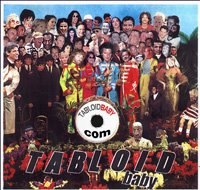It’s amusing that the hand-wringing continues twenty years later over the use of reenactments and payments to interview subjects in documentaries, and funnier still that the latest uproar is centered on Errol Morris, because the quirky documentarian's breakthrough doco, The Thin Blue Line, was released in 1988 and was closely tied to the tabloid television show, A Current Affair.
The New York Times works up a scandal today over Morris’ payment of interview subjects and his reenactment techniques in his $5 million film-- mainly because the practice is rubbing off on the print industry (the movie’s being adapted as a book that was excerpted in The New Yorker). But its concerns over film and television practices are old news, even though the producers using them are still concerned that the public might find out what’s in the sausages they produce.
A Current Affair was pioneering the use of reenactments in television journalism, candid about paying for story exclusivity and taking a lot of heat for it when Morris came out with his artsy film about a man who was apparently railroaded in the murder of a Texas cop. The television show’s championing of the film, and its constant coverage of the case helped Morris’ campaign to have Randall Dale Adams’ conviction overturned. And in fact, after Adams was set free, he entered into a romantic relationship with the (female) A Current Affair editor who’d worked on the segments (help us out: Did they get married?).
Twenty years passed. The reenactments and story-telling techniques used by Morris and developed by tabloid television innovators were coopted by network news organizations in their prime time magazine shows.
 And as the stories of ordinary people caught in extraordinary situations were exploited for television ratings, dramatic effect or, in the case of filmmakers like Morris or Michael Moore, millions of dollars in profits and residuals, those ordinary people holding the stories realized that their lives and experiences were commodities they deserved to be paid for. And while there’s been no evidence that paying story subjects has led them to embellish or overly dramatize their stories, you’ve got to admit it’s only fair that people who are being exploited-- and literally put to work-- should be paid for their time, which often includes taking time off from work, travel to a shooting location, and the ordeal of sitting under hot lights for hours at a time while being grilled on matters often not pleasant to relive but which become fodder for books, films and TV shows.
And as the stories of ordinary people caught in extraordinary situations were exploited for television ratings, dramatic effect or, in the case of filmmakers like Morris or Michael Moore, millions of dollars in profits and residuals, those ordinary people holding the stories realized that their lives and experiences were commodities they deserved to be paid for. And while there’s been no evidence that paying story subjects has led them to embellish or overly dramatize their stories, you’ve got to admit it’s only fair that people who are being exploited-- and literally put to work-- should be paid for their time, which often includes taking time off from work, travel to a shooting location, and the ordeal of sitting under hot lights for hours at a time while being grilled on matters often not pleasant to relive but which become fodder for books, films and TV shows.The Times is correct in saying there are “conflicting reactions among those in the world of film documentaries,” but it’s dead wrong in writing that “American newspapers, magazines and television news divisions do not generally pay subjects for their interviews; their caution is rooted in a belief that the credibility of interviewees diminishes when money changes hands and that these people will provide the answers they think are desired rather than the truth.”
Newspaper reporters with their notebooks (or in the case of Robery Downey Jr., a Dictaphone) may not pay for their doorstep interviews. Magazines, in other hand do pay. And so do television news divisions.
Television news divisions pay for interviews.
 The payments are often disguised as travel expenses, payment for “materials” like photos or videos, “consultancies,” or (as the Times pointed out in the case of HBO and Rory Kennedy) “honorariums,” but in the highly competitive business of exclusives and “gets,” the interview subjects’ choices are rarely determined by whether they have the hots for Barbara Walters or Katie Couric.
The payments are often disguised as travel expenses, payment for “materials” like photos or videos, “consultancies,” or (as the Times pointed out in the case of HBO and Rory Kennedy) “honorariums,” but in the highly competitive business of exclusives and “gets,” the interview subjects’ choices are rarely determined by whether they have the hots for Barbara Walters or Katie Couric.They pay. A Current Affair took the hit for admitting it. Twenty years ago. And twenty years later, Errol Morris deserves a tip of the Tabloid Baby hat for his candor.
Excerpts from the Times article (and be sure to catch the line about brave Michael Moore):
“I paid the ‘bad apples’ because they asked to be paid, and they would not have been interviewed otherwise,” (Morris) said in a statement…
Some, though, said that documentary subjects have routinely been paid for many years — and that failure on the part of filmmakers to share the wealth might actually constitute abuse of people whose troubles will become the stuff of a profit-making enterprise.
“It’s not all that uncommon, it’s just something most people don’t talk about,” said Diane Weyermann, executive vice president of Participant Productions, which helped finance “Standard Operating Procedure,” and was a producer of “An Inconvenient Truth” and “Jimmy Carter Man From Plains.”
“Sometimes, you’re paying subjects who have nothing,” Ms. Weyermann said. “You’re making a film about them, and you don’t want to exploit them.”
But in the case of “Standard Operating Procedure,” the payments have reverberations in the realm of print, where cash compensation for an interview violates a deep taboo. A book linked to the film, by Mr. Morris and Philip Gourevitch, is scheduled for publication on May 15… Mr. Gourevitch said the payments did not trouble him… He said he had based his own work largely on interviews Mr. Morris compiled for the movie and was aware that some interviewees had consulting agreements with Mr. Morris, in keeping with common film industry practice, but he did not know which.
(The New Yorker editor) David Remnick… added that Norman Mailer’s book “The Executioner’s Song” involved payments to sources, and that he would have excerpted it, if given the chance. “The book is a masterpiece,” he said.
In the interview on Thursday night Mr. Morris expressed some ambivalence about whether these payments should have been disclosed in the film… “I perhaps should have. I didn’t feel the necessity of doing it. I didn’t disclose at the end of ‘A Brief History of Time’ that Stephen Hawking was paid a considerable amount of money to appear in that film, and for the rights to his book.
“...Without these extensive interviews, no one would ever know their stories.”
“I can’t say this is any type of scandal or anything abnormal,” Tom Bernard (of Sony Classics, the film’s distributor) said on Thursday. He noted that documentary makers faced an ever more difficult fight for access to prime subjects, as the number of filmmakers expanded, and interviewees became more aware of the profit potential in nonfiction films.
Indeed, a documentary as hallowed as “Grey Gardens”... involved payments.
A spokesman for Michael Moore, known for highly polemical documentaries like “Fahrenheit 9/11” and “Sicko,” said he did not know Mr. Moore’s policy regarding payment to subjects and was unable to reach him.
Some, though, said that documentary subjects have routinely been paid for many years — and that failure on the part of filmmakers to share the wealth might actually constitute abuse of people whose troubles will become the stuff of a profit-making enterprise.
“It’s not all that uncommon, it’s just something most people don’t talk about,” said Diane Weyermann, executive vice president of Participant Productions, which helped finance “Standard Operating Procedure,” and was a producer of “An Inconvenient Truth” and “Jimmy Carter Man From Plains.”
“Sometimes, you’re paying subjects who have nothing,” Ms. Weyermann said. “You’re making a film about them, and you don’t want to exploit them.”
But in the case of “Standard Operating Procedure,” the payments have reverberations in the realm of print, where cash compensation for an interview violates a deep taboo. A book linked to the film, by Mr. Morris and Philip Gourevitch, is scheduled for publication on May 15… Mr. Gourevitch said the payments did not trouble him… He said he had based his own work largely on interviews Mr. Morris compiled for the movie and was aware that some interviewees had consulting agreements with Mr. Morris, in keeping with common film industry practice, but he did not know which.
(The New Yorker editor) David Remnick… added that Norman Mailer’s book “The Executioner’s Song” involved payments to sources, and that he would have excerpted it, if given the chance. “The book is a masterpiece,” he said.
In the interview on Thursday night Mr. Morris expressed some ambivalence about whether these payments should have been disclosed in the film… “I perhaps should have. I didn’t feel the necessity of doing it. I didn’t disclose at the end of ‘A Brief History of Time’ that Stephen Hawking was paid a considerable amount of money to appear in that film, and for the rights to his book.
“...Without these extensive interviews, no one would ever know their stories.”
“I can’t say this is any type of scandal or anything abnormal,” Tom Bernard (of Sony Classics, the film’s distributor) said on Thursday. He noted that documentary makers faced an ever more difficult fight for access to prime subjects, as the number of filmmakers expanded, and interviewees became more aware of the profit potential in nonfiction films.
Indeed, a documentary as hallowed as “Grey Gardens”... involved payments.
A spokesman for Michael Moore, known for highly polemical documentaries like “Fahrenheit 9/11” and “Sicko,” said he did not know Mr. Moore’s policy regarding payment to subjects and was unable to reach him.







































No comments:
Post a Comment